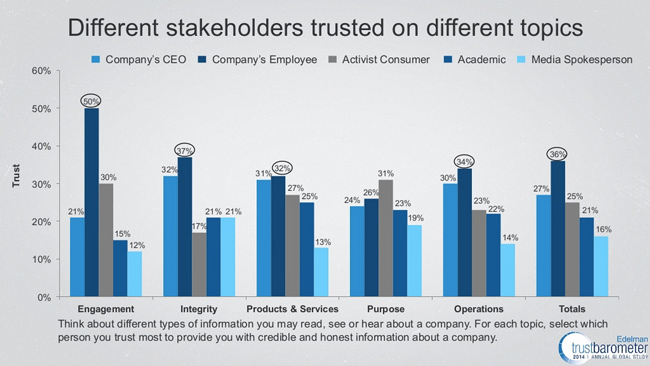In the marketing world, things are shaking up. We're stepping away from the usual influencer buzz to something more genuine and impactful: Employee ambassador marketing. This isn't a sudden switch but a gradual shift fueled by a deeper appreciation for the genuine connection and value that employees can bring as the true advocates of a brand. As transformation is happening, it is essential to understand the nuances of this marketing strategy, its evolution, its current significance, and the trends set to shape its future.
I’m Stacy Sherman, and for over a decade I've had the privilege of spearheading marketing initiatives for a diverse range of B2B and B2C companies, adapting to various scales and budgets. This journey has transformed me into more than just a practitioner; I am also a skilled educator in this sector, constantly evolving through ongoing research. As I share my insights through this article, know that this is not just a profession to me. It's a passionate journey of forging authentic connections between people and brands, a venture I am deeply committed to and excited to help you navigate. So, let’s get into it.
What Are Employee Ambassadors?
Employee ambassadors are individuals within an organization who voluntarily vouch for the company's values, products, and services, often extending beyond their job descriptions to promote the brand through various channels, including social media. These ambassadors are not mere employees but are passionate advocates and the face of the company in the public domain, fostering a sense of trust and authenticity that resonates with the audience.
The Evolution Of Employee Ambassadors
Historically, employees were rarely involved in marketing initiatives, confined to their designated organizational roles. However, the advent of social media platforms and the increasing demand for authentic brand interactions have propelled employees to the forefront as trusted voices in the marketing arena. Their firsthand experiences and insider perspectives have given them credibility that is hard to achieve through traditional marketing channels.
Over the years, companies have begun to recognize the untapped potential of employee advocates, fostering internal ambassadors who can organically promote the brand within their networks. This shift is fueled by the understanding that employees, with their genuine endorsements and testimonials, can bridge the trust gap between consumers and brands, fostering a deeper connection and engagement.
What Ambassador Marketing Is Not
As explained in my article, "Influencer Marketing: The Power of Authenticity & Lessons from HBO's Fake Famous," a massive following doesn't necessarily equate to genuine influence. This serves as a significant nudge for marketers and brand leaders to shift their strategies and prioritize forming authentic bonds with their audience. The essence of employee ambassador marketing lies in being genuine, authentic, and true.
To further clarify, here are some points illustrating what ambassador marketing is not:
- A Numbers Game: It's not about accumulating a massive number of followers or likes; it's about fostering genuine connections and engagements.
- Quick Fix: Building a successful ambassador marketing strategy takes time and cannot be established overnight through paid promotions or fabricated content.
- Superficial Engagement: It's not about creating a facade with polished, picture-perfect narratives. Authentic marketing delves deeper, sharing real stories and experiences.
- Manipulative: Authentic ambassador marketing doesn't involve manipulating the audience's perceptions with false information or exaggerated claims.
- Isolated Efforts: It's not a one-department show. Successful ambassador marketing involves collaboration across various departments to create a unified and authentic brand message.
- Static: Ambassador marketing is not a set-it-and-forget-it strategy. It evolves, adapting to changing trends and audience preferences.
Understanding and avoiding these pitfalls can guide brands to craft an ambassador marketing strategy that resonates on a deeper, more authentic level with their audience.
Why Employee Ambassadors Are Your Best Marketing Asset
In the current market dynamics, employee ambassadors stand as a beacon of trust and authenticity for several reasons:
1. First Hand Experience: Employees have first hand experiences with the company's products and services, which lends credibility and authenticity to their endorsements, fostering a deeper connection with potential customers.
2. Increased Engagement: According to a study by the Marketing Advisory Network, 90% of consumers trust suggestions from people they know, compared to only 33% who trust messages from a brand. Employee ambassadors, with their personal networks, can significantly increase engagement and foster trust with consumers.
3. Cost-Effectiveness: Leveraging employee ambassadors can be a cost-effective marketing strategy. Instead of investing heavily in influencer marketing campaigns, companies can utilize their employees' networks to reach a wider audience without incurring substantial costs.
4. Alignment with Company Goals: Employee ambassadors naturally align their advocacy with the company's goals and values. Their success is intertwined with the company's success, creating a symbiotic relationship that fosters genuine and passionate brand promotion.

Breaking Company Silos: The Key To Successful Employee Ambassador Programs
For an employee ambassador program to succeed, breaking down company silos and fostering collaboration across various departments is vital. Traditionally, marketing initiatives were confined to the marketing department, but the changing dynamics necessitate the involvement of employees across the organization. Here's why it's essential to have ambassadors across the company:
1. Diverse Perspectives: Employees from different departments bring diverse perspectives, enriching the brand narrative with multifaceted stories and experiences.
2. Unified Brand Message: When employees across the organization become brand ambassadors, it fosters a unified message, enhancing the brand's credibility and reach.
3. Collaboration between Marketing and Customer Experience Teams: The collaboration between marketing and customer experience teams is crucial in rallying front-line and back-office staff. This collaboration ensures that the brand message is consistent and resonates well with the target audience, creating a cohesive and powerful brand image.
4. Enhanced Customer Engagement: When employees from various departments engage with customers, it creates a more holistic and enriched customer engagement, fostering loyalty and trust.
To achieve this, companies need to foster a speak up culture of collaboration and open communication, where ideas and strategies are shared freely across departments. Training programs and workshops can be instrumental in equipping employees with the necessary skills and knowledge to become effective brand ambassadors.
Companies Excelling In Employee Ambassador Marketing
Several companies have successfully harnessed the power of employee ambassadors, creating a ripple effect of positive brand perception and increased engagement. Here are some notable examples:
1. Starbucks
Through its "Barista Life" campaign, Starbucks encouraged employees to share their experiences working at the company, fostering a community of brand advocates who were more credible than external influencers. This initiative not only boosted morale but also painted the brand in a positive light.
2. Adobe
The company has taken a significant step in empowering its employees to be brand ambassadors. Through its #AdobeLife campaign, the company encourages employees to share their personal stories and experiences at Adobe on social media platforms. This initiative has not only helped portray Adobe as a great place to work but also in attracting top talent and fostering a sense of community and authenticity.
3. Zappos
Known for its exceptional customer service, Zappos has also excelled in employee advocacy. The company encourages its employees to be themselves and share their experiences, creating a passionate and authentic brand image. Listen to Alex Genov, Head of Marketing and Research at Zappos on the Doing CX Right podcast to hear firsthand about the company culture and what you can do too to boost employee experiences and advocacy.
The Changing Workforce: Creating Ambassadors Across Generations
Creating and nurturing employee ambassadors requires customization as the workforce undergoes a shift. Different generations have varied values, expectations, and communication styles. Here's how brand leaders can create ambassadors across different generations:
1. Gen Z (1997-2012)
This generation, currently entering the workforce, values authenticity and social responsibility. Companies can foster Gen Z ambassadors by encouraging them to share their experiences related to corporate social responsibility initiatives and authentic stories about the brand. Moreover, providing platforms for them to voice their opinions and ideas can be a great way to engage them.
2. Millennials (1981-1996)
A significant portion of the current workforce value work-life balance and personal growth. Companies can foster millennial ambassadors by showcasing opportunities for growth and development within the organization, encouraging them to share their personal growth stories. Additionally, offering flexible work environments and opportunities for skill development can be attractive for this group.
3. Gen X (1965-1980)
This generation values stability and job security. Companies can engage Gen X employees by encouraging them to share stories that highlight the company's stability and growth prospects. Moreover, recognizing their contributions and providing leadership opportunities can be effective strategies.
4. Baby Boomers (1946-1964)
Although nearing retirement, this generation still forms a significant part of the workforce. They value loyalty and have a wealth of experience. Companies can engage them by encouraging mentorship programs where they can share their experiences and insights with younger generations.
5. Next Generation
While it's too early to pinpoint the exact preferences of the next generation, companies need to adapt their programs to cater to the evolving needs and preferences of the future workforce. Keeping an eye on emerging trends and fostering a culture of inclusivity and adaptability will be critical.
By understanding each generation's unique characteristics and preferences, companies can create tailored programs that resonate well with different groups, fostering a diverse and vibrant community of employee ambassadors.
Sustaining The Employee Ambassador Initiative
Sustaining the employee ambassador initiative over time requires a strategic approach. Here's how to keep a pulse on the program and ensure its longevity:
1. Regular Training and Development: Implement regular education and development programs to equip ambassadors with the necessary skills and knowledge to promote the brand effectively.
2. Feedback and Continuous Improvement: Establish channels for continuous feedback and improvement, allowing ambassadors to share their insights and suggestions for the program.
3. Recognition and Rewards: Develop a recognition and reward system that appreciates the efforts of employee ambassadors, fostering a sense of motivation and loyalty.
4. Monitoring and Adjustments: Regularly monitor the program and make necessary adjustments based on changing market dynamics and company goals.
5. Open Communication Channels: Maintain open communication channels to understand the changing perspectives and needs of the ambassadors, adapting the program accordingly to retain their interest and engagement.
Embracing Authenticity
In conclusion, employee ambassadors are transforming the marketing game, and they may be just as good if not better than influencers at influencing customer decisions. By embracing employee ambassadors' real stories and enthusiasm, companies can create a brand people trust and genuinely love.
As we venture forward, company leaders must keep their fingers on the pulse of this trend, making the most of the golden opportunity that employee ambassadors present for business growth. And remember, when it comes to marketing and customer experience, nothing beats the real deal. Being authentic isn't just a strategy; it's about building true connections and trust with your audience. So, toss the 'fake famous' act aside and dive into marketing grounded in real stories and experiences that speak to people's hearts.
If you enjoyed this article, be sure to subscribe to The CMO newsletter and follow us on LinkedIn so you don’t miss a beat.



